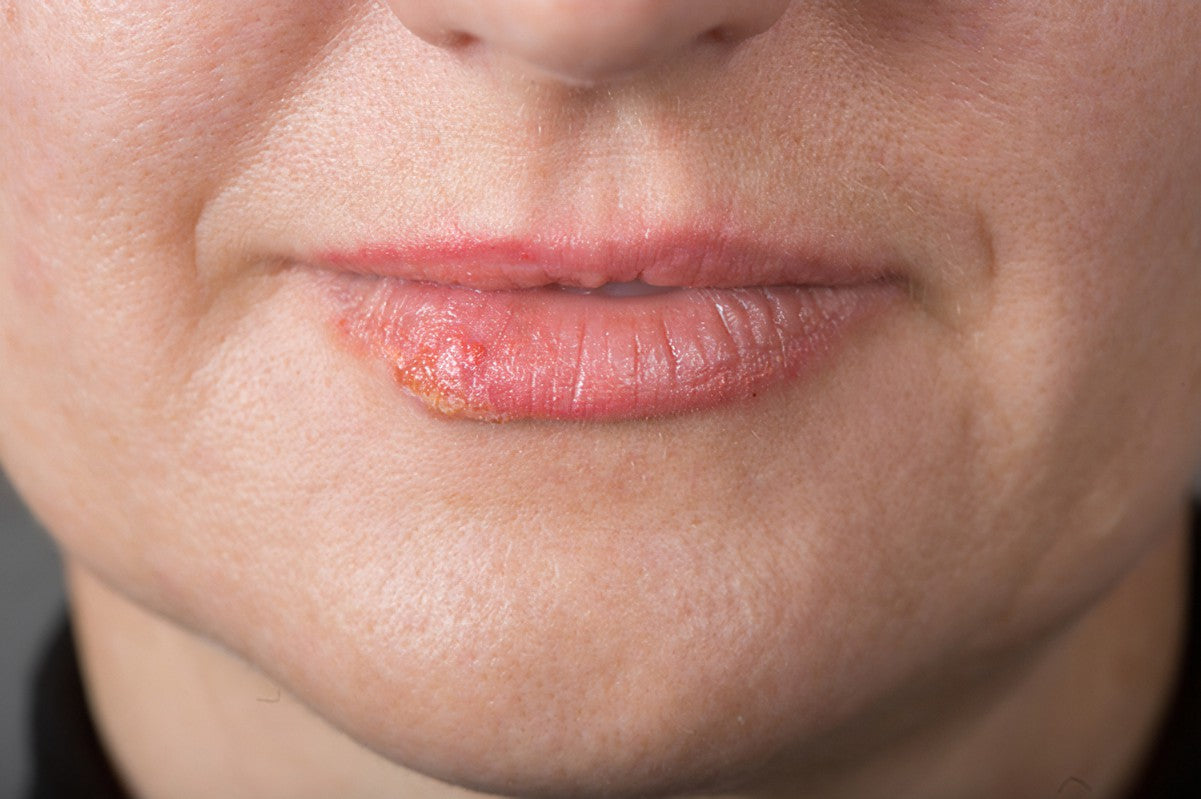
Kiss Winter Cold Sores Goodbye!
Cold sores are common throughout the year, in any weather. However, cold weather tends to activate cold sores, due to various reasons which we will go through below. If you're looking for the best ways to keep cold sores at bay, we'll also be giving you the best advice for preventing and quickly treating the reappearance of those pesky cold sores!
What is a cold sore
Cold sores, also known as fever blisters, are a common viral infection that causes small fluid-filled blisters on and around your lips. They're commonly caused by the herpes simplex virus type 1 (HSV-1) and less commonly caused by the herpes simplex virus type 2 (HSV-2).

The virus can be passed from person to person through saliva or sharing of utensils. Cold sores can also be spread to the genital areas.
Unfortunately, once infected, the virus is with you for life. There's no cure but treatment can help manage outbreaks. Although the sores come and go, they remain contagious even if you don't see the sores. There are various things that can help the sores heal faster, and reduce the frequency and severity of outbreaks.
What causes cold sores in winter
- Cold weather leaves the body susceptible to all types of illnesses and infections. While the cold doesn't directly make people sick, it weakens the immune system which in turn makes the body vulnerable to cold sores and other conditions.
- Cracked, dry lips caused by cold, windy weather are perfect doorways for the virus to enter and exit (making the transmission of the virus much easier). Indoor heating has the same effect.
- A weak immune system allows the virus to thrive in your body. A regulated immune system will keep the virus controlled.
- Lack of sunlight weakens the immune system and also slows down healing of the skin and other organs. Vitamin D (which we get from sunlight) is vital for skin health and immune health.
- Stress triggers an increased production of cortisol (also known as the stress hormone), which weakens the immune system and also causes inflammation in the body. The virus flourishes when the immune system weakens.
How to treat and manage cold sores
1. Keep your lips hydrated and protected
Cracked and dry lips increase the infection and transmission of cold sores. Keeping your lips hydrated by drinking enough water on a daily basis and investing in a good quality lip balm (with healing properties) is one of the best ways to prevent and treat cold sores!
Browse our selection of soothing, healing and nourishing lip balms >
2. Avoid indoor heating
While artificial indoor heating can feel glorious when temperatures plummet, the warm heat quickly dries out your skin and lips which encourages the virus to flare up! As we mentioned above, cracked and dry lips increase the infection and transmission of cold sores, so you definitely want to avoid indoor heating as much as possible.
Instead of using indoor heating, make sure you're dressed with enough warm layers, or invest in a FLAXi Heat Bag or hot water bottle to keep you warm in winter.
3. Boost your immune system
The immune system and cold sores are directly related. If your immune system is healthy and regulated, your body will be able to manage the virus, and you might not even see an outbreak for years! If your immune system falters, the virus will be able to flourish and you are likely to repeatedly get cold sores.
Make sure you eat enough fresh fruits and vegetables, get enough sleep, take daily supplements to boost your health and exercise! Remember, your mental health also has an effect on your immune system.
Browse our selection of natural mood boosters for anxiety, depression and brain fog >
4. Spend time outdoors
While it might be difficult in the winter, try to get out during the day as much as possible, even if it's only for 10 minutes. Reason being is that Vitamin D is produced in your skin when your skin is exposed to sunshine. Vitamin D is super important for immunity and healing of various skin conditions, including cold sores! Since sunlight helps us produce Vitamin D, less sun in the winter can lead to a Vitamin D deficiency.
Taking a Vitamin D supplement especially in the winter will help you avoid becoming deficient in Vitamin D, and therefore, will help you avoid cold sores!
How to quickly treat a cold sore
Besides the preventative measures mentioned above, there are a few things one can apply on to a cold sore to quickly get rid of it. Here are the top recommendations for treating a cold sore:
- Colloidal Silver Gel (applied directly)
- Tea Tree Essential Oil or Peppermint Essential Oil (diluted in a carrier oil)
- Apple Cider Vinegar (diluted in water)
- Raw organic honey (applied directly)
- Raw Propolis Tincture (applied directly)
Important! Never try to pop or squeeze a cold sore, it is not a pimple. Attempting to pop the cold sore will be painful and will result in viral fluid spreading onto your face. This also increases the chances of spreading the virus to somebody else. You also need to avoid sexual contact (including kissing and oral sex) while you have a cold sore.
If you have any health-related questions, please contact us or leave a comment below for FREE advice. We always love hearing from you!






Leave a comment